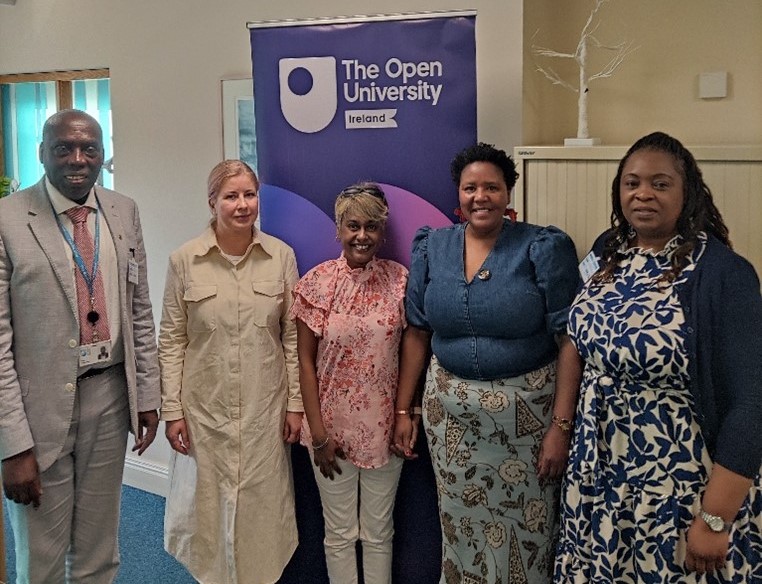Insights from the CVSL’s Belfast Minority Ethnic Leadership (MEL) Programme Learning Hub
In this blog, Olufemi (Femi) Oloruntimehin (law student and CVSL Intern) discusses his insights into the proceedings at a hybrid MEL Programme learning hub held in Belfast on May 7th, 2025. The session featured two OU alumni (Ana and Nandi) as motivational speakers. In this article, Femi shares his lessons from the session.

Picture featuring from the left: Dr Fidele Mutwarasibo, Jurita Naumane, Ana Chandran, Nandipha (Nandi) Jola and Lori Gatsi-Barnett
The MEL Programme comprises three components: a 30-credit level one undergraduate course (Making Your Learning Count at Work), 150 hours of OpenLearn courses (including Introducing Black Leadership and Advancing Black Leadership), and in-person learning hubs. Learning hubs provide learners with the opportunity to engage in peer learning activities, ad-hoc mentoring, and hear from motivational speakers. Learners also have the chance to get to know each other and, in the process, expand their professional networks. The learning hubs introduce learners to experienced Minority Ethnic leaders who use their keynote to share insights into how they navigated the challenges they faced.
In this piece, I will focus on Ana Chandran’s contribution to the workshop. Ana is the founder and director of projects for the Belfast Asian Women's Academy (BAWA); her experiences were insightful and eye-opening as to the plight of ethnic minority professionals. She discussed her experiences after moving from London to Belfast, where she found it exceedingly difficult to continue her career and faced limited opportunities for advancement. Ana had to take low-paid entry-level roles after having held management roles, and she attributed this to her ethnicity, which prompted her to shorten her name to an anglicised version. This adjustment vastly improved her chances of getting an interview; however, the barriers persisted as soon as she attended the interviews.
Anna’s firsthand experiences going further were also enlightening on the issue of “lack of interest,” especially her experiences within organisations with a perfect understanding of the equality legislation and anti-discrimination policies. However, the discrimination persisted, and there was a sense of being ignored by organisations established to address these issues. Therefore, Ana ended up self-representing, and she won her case. This experience led her to create BAWA, which now helps people in similar situations.
Self/community censorship was also another topic I picked from Ana's presentation. This observation was fascinating because it is something I have personally witnessed from family and other members of the Nigerian community, where it is looked down upon when complaints of discrimination are raised as an obstacle. Still, things began to change as she spoke about it, and other people going through the same circumstances started to come forward. This experience led to the formation of BAWA, and they began taking action.
Lessons for MEL Programme Participants and other aspiring Minority Ethnic Leaders
- Passion-Have passion for what you want to excel in.
- Self-belief - Always have faith in yourself, recognise your value and worth, and do not compromise for shortcuts.
- Dedication and perseverance-The speakers had challenges in common. Still, to succeed, they all had to power through and find ways to overcome those barriers and not give up, as in the case of Nandi Jola, who eventually got her works published, which started as a form of security in the event of a mishap but due to her perseverance those became published works, and now she is an accomplished artist.
- Question yourself- Always ask the question, "What have I done constructively with the time I have had.”
- Do not keep quiet (loudness works/make yourself heard). If you stay quiet, discrimination will continue. According to Nandi Jola, you should ask, demand, and not keep silent. If the door needs knocking on, then do so. Let your voice be heard and be visible.
- Frustration is fuel. Turn your frustration into fuel to succeed. Ana established BAWA out of frustration from people telling her she was not good enough and the lack of interest in the plights she and others were facing. She turned that frustration into an organisation which raises other people up.
My Takeaways for the Future
During the workshop, I found some of the discussion helpful and ammunition I can take moving forward after the completion of my Law programme; it instilled some confidence in me and made me aware that even though I hope to work within the legal profession and contrary to my expectations, discrimination is also faced within a profession where I would least expect to find it. However, my takeaway is that I must never lose hope and not give up. Additionally, I can utilise my knowledge beyond the mainstream employers in my discipline, and I should view any future disappointments as opportunities to diversify or look outward.
The workshop shed light on the issue of power within organisations. From the discussions, I understood the need for balance between being invisible yet in plain sight and being heard and noticed. It brought to the fore my reasoning for the previous topics of power in organisations and how to navigate such power structures, such as the example of dressing up to fit the occasion, as we have to be aware of how we are perceived by the various audiences we are serving, so as not to make the powers that be feel threatened and not to alienate peers, while at the same time striving to achieve one's goals within the structure.
I also observed the need for allies from other ethnic groups, either majority groups or other minority groups, in the fight against discrimination in all areas of life and appreciate that they understand to varying extents the issues ethnic minorities face; however, there also needs to be care in finding a balance in how we express not just our experiences but in the moderation of emotions when speaking about it because it could be the case where we make allies feel guilty and ashamed about issues they have not caused or participated in while they are also helping and joining in the fight against discrimination. This is a lesson I will take with me in the future.
The workshop highlighted the work of leaders in the voluntary sector, emphasising the importance of their efforts and the collaboration they are fostering with other sectors to promote effective leadership across organisations in every industry, ultimately driving change to benefit society.
Overall, the workshop showed the value of the MEL programme to students, leaders, business owners and aspiring future leaders. The programme equips individuals and organisations with the necessary tools to produce effective and productive leaders in a more equitable world.


